By Leen Randell
Updated: Jul 19, 2024
10 Best Herbal Creams For Fever Blister On Lip
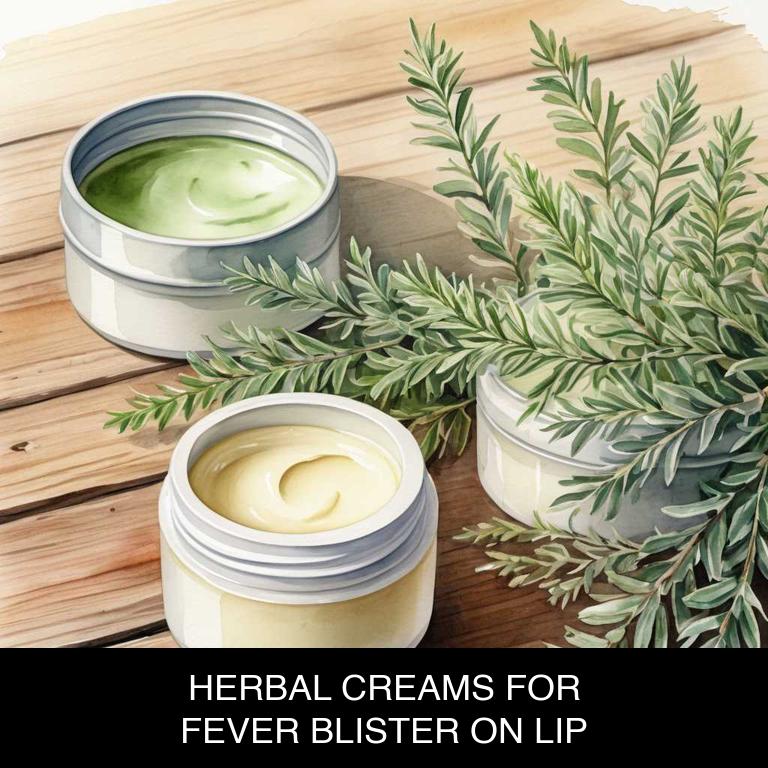
Herbal creams for fever blister on lip are topical products infused with natural ingredients that help alleviate the discomfort and symptoms of cold sores.
They often contain ingredients like aloe vera, tea tree oil, and vitamin E, which have antiviral and anti-inflammatory properties that aid in healing and reducing pain.
Examples include creams with calendula, chamomile, and licorice root, which can reduce redness and promote faster recovery, improving quality of life for individuals prone to fever blisters.
The following article describes in detail the most important creams for fever blister on lip, including medicinal properties, parts of herbs to use, and recipes for preparations.
- 1. Melaleuca alternifolia
- 2. Calendula officinalis
- 3. Aloe vera
- 4. Matricaria chamomilla
- 5. Lavandula angustifolia
- 6. Glycyrrhiza glabra
- 7. Echinacea purpurea
- 8. Sanguisorba minor
- 9. Plantago major
- 10. Symphytum officinale
- What is the best combination of herbal creams to use for fever blister on lip?
- What ailments similar to fever blister on lip are treated with herbal creams?
1. Melaleuca alternifolia
Melaleuca alternifolia, also known as tea tree, creams helps with fever blister on lip because of its potent antimicrobial and anti-inflammatory properties.
The cream's active ingredient, melaleuca oil, has been shown to reduce the severity and duration of cold sore outbreaks, while also promoting faster healing of the affected area.
The antiviral properties of tea tree oil help combat the herpes simplex virus that causes fever blisters, making it an effective natural remedy for soothing and treating lip sores.
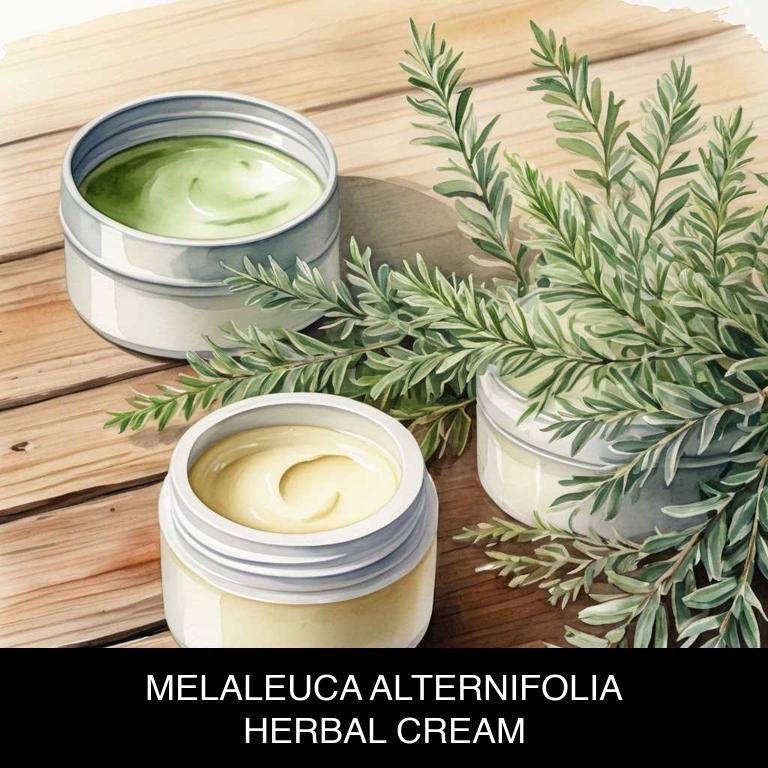
Medicinal Constituents
The list below shows the primary medicinal constituents in Melaleuca alternifolia creams that help with fever blister on lip.
- Cineole: Helps to reduce the severity and duration of fever blisters by its antimicrobial and anti-inflammatory properties, which inhibit the growth of the herpes simplex virus.
- Cymene: Exhibits antiviral and antibacterial properties that aid in reducing the viral load and preventing secondary infections associated with fever blisters.
- Methyleugenol: Demonstrates antiviral and anti-inflammatory activities that contribute to the healing process of fever blisters by reducing redness, swelling, and pain.
Parts Used
The list below shows the primary parts of tea tree used to make creams for fever blister on lip.
- Leaves: Essential oil from Melaleuca alternifolia leaves is commonly used to create creams for fever blisters due to its antimicrobial and antiviral properties.
- Seeds: Although not as commonly used, some products may include seed extracts due to their potential antiseptic and anti-inflammatory properties, which can aid in the healing of fever blisters.
- Buds: Some creams for fever blisters may contain Melaleuca alternifolia bud extracts, which have been found to exhibit antimicrobial properties, helping to reduce the risk of infection and promote healing.
Quick Recipe
The following recipe gives a procedure to make a basic tea tree for fever blister on lip.
- Harvest 20-30 leaves from mature plants in a clean environment to ensure minimal contamination.
- Dry the leaves in a cool dry place for 7-10 days to reduce moisture content.
- Steep 10-15 dried leaves in 1 liter of carrier oil such as coconut or sweet almond oil for 2-3 weeks.
- Strain the infused oil through a cheesecloth or coffee filter into a clean container to remove solids.
- Mix the infused oil with beeswax and shea butter in a 1:1 ratio to create a smooth and stable cream.
2. Calendula officinalis
Calendula officinalis, also known as pot marigold, creams helps with fever blister on lip because of its anti-inflammatory and antiseptic properties.
The cream's ability to soothe and calm irritated skin reduces redness and swelling associated with fever blisters. Its antimicrobial action also helps to combat bacterial and viral infections that cause fever blisters. Additionally, calendula's natural emollient properties promote wound healing, accelerating the recovery process and reducing the risk of scarring.
This makes calendula creams an effective natural remedy for fever blisters on the lip.
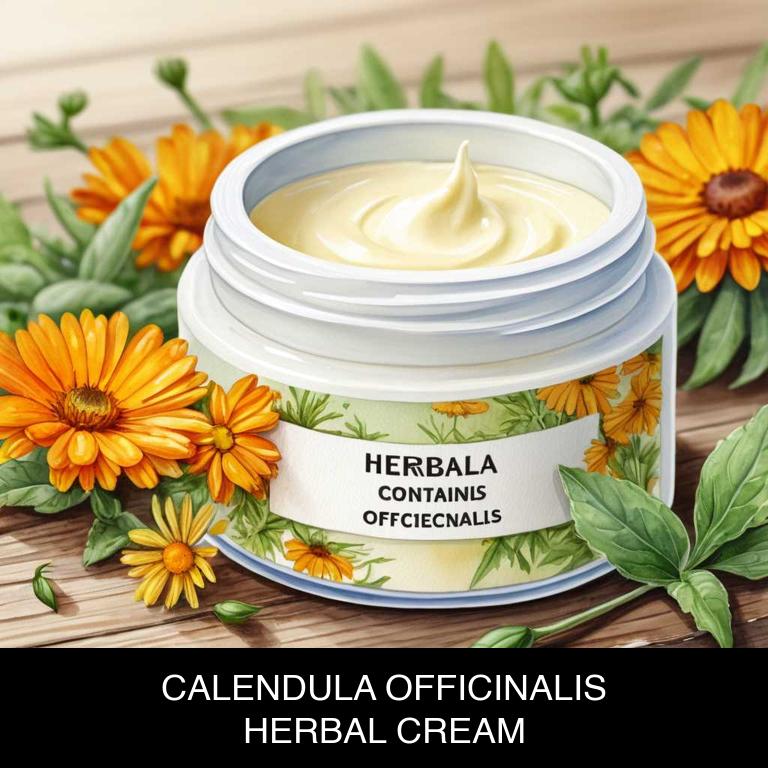
Medicinal Constituents
The list below shows the primary medicinal constituents in Calendula officinalis creams that help with fever blister on lip.
- Sesquiterpene lactones: These compounds have anti-inflammatory and antimicrobial properties, which help reduce redness and inflammation associated with fever blisters.
- Flavonoids: Flavonoids exhibit potent antioxidant and anti-inflammatory activities, which can help reduce the severity and duration of fever blisters.
- Phenolic acids: These compounds possess antimicrobial and anti-inflammatory properties, which can aid in the treatment and prevention of fever blisters by reducing the growth of the herpes simplex virus.
Parts Used
The list below shows the primary parts of pot marigold used to make creams for fever blister on lip.
- Flowers: They are used due to their anti-inflammatory and antiseptic properties that aid in soothing and healing fever blisters.
- Leaves: They are used due to their astringent and antiseptic properties that help to dry out the blister and reduce the risk of infection.
- Stems: They are used due to their ability to provide a base or carrier for the other calendula extracts, making it easier to apply the cream to the affected area.
Quick Recipe
The following recipe gives a procedure to make a basic pot marigold for fever blister on lip.
- Harvest 1 cup of calendula flowers when in full bloom and dry them completely for 2 weeks.
- Steep 1 cup of dried flowers in 2 cups of boiling water for 10 minutes to make a strong infusion.
- Strain the infusion through a cheesecloth or fine mesh and discard the solids.
- Mix 1/2 cup of beeswax and 1/2 cup of coconut oil in a double boiler over low heat.
- Add 2 tablespoons of the calendula infusion to the melted wax and oil mixture and stir well.
3. Aloe vera
Aloe vera, also known as aloe, creams helps with fever blister on lip because of its anti-inflammatory and antiviral properties.
The gel from the aloe vera plant soothes and calms the affected area, reducing redness and swelling. Aloe vera's cooling effect also helps to ease pain and discomfort associated with fever blisters. Its natural antibacterial and antifungal properties prevent infection, promoting faster healing and reducing the risk of scarring.
This makes aloe vera creams an effective and natural remedy for fever blisters on the lip.
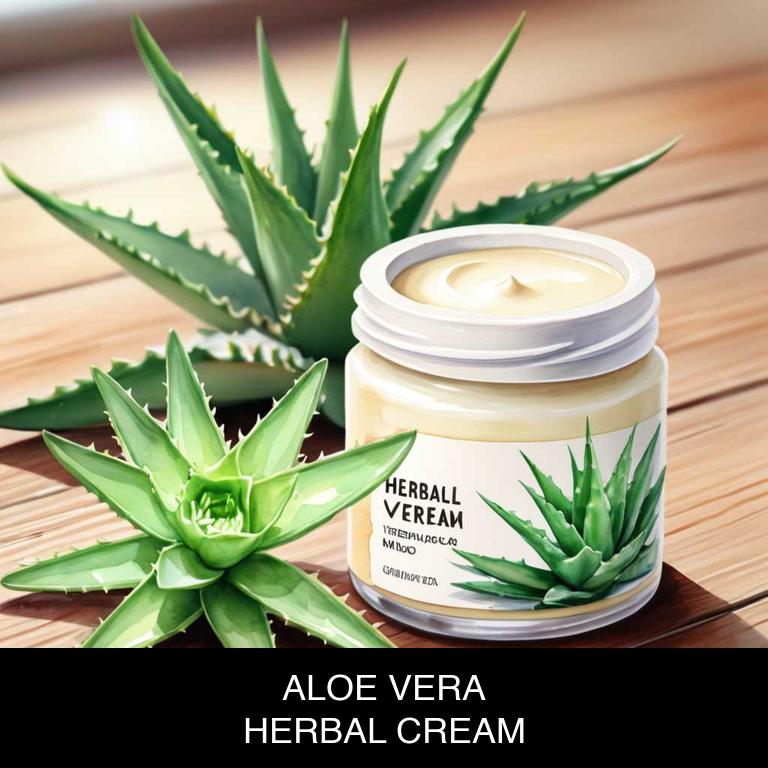
Medicinal Constituents
The list below shows the primary medicinal constituents in Aloe vera creams that help with fever blister on lip.
- Aloe-emodin: Aloe-emodin, a anthraquinone compound, has anti-inflammatory properties that help reduce the swelling and pain associated with fever blisters.
- Aloe vera polysaccharides: Aloe vera polysaccharides have immune-modulating and anti-inflammatory effects, which help to reduce the severity and duration of fever blisters.
- Glucomannan: Glucomannan, a type of soluble fiber, has anti-inflammatory and soothing properties that help to reduce the discomfort and pain associated with fever blisters, and promote wound healing.
Parts Used
The list below shows the primary parts of aloe used to make creams for fever blister on lip.
- Leaves: Aloe vera leaves are primarily used due to their high gel content, which is rich in soothing and anti-inflammatory properties.
- Leaves: The gel from aloe vera leaves also contains vitamins A, C, and E, which help to accelerate the healing process of fever blisters.
- Leaves: Aloe vera leaf extracts have been found to have antiviral properties, which can help to reduce the severity and duration of fever blisters.
Quick Recipe
The following recipe gives a procedure to make a basic aloe for fever blister on lip.
- Weigh 100 grams of aloe vera gel and 50 grams of coconut oil to combine ingredients.
- Melt the coconut oil in a double boiler for 10 minutes to achieve a smooth consistency.
- Mix 20 grams of beeswax and 10 grams of shea butter with the melted coconut oil.
- Blend the mixture for 5 minutes to incorporate the ingredients and achieve a smooth texture.
- Pour the mixture into a container and let it set for 30 minutes to solidify completely.
4. Matricaria chamomilla
Matricaria chamomilla, also known as chamomile, creams helps with fever blister on lip because of its anti-inflammatory and antiseptic properties.
The cream's soothing and calming effects reduce pain and swelling, making it easier to manage the discomfort associated with fever blisters. Chamomile's ability to promote healing and reduce redness also helps to speed up the recovery process, allowing the lip to return to its normal state sooner.
Its natural and gentle properties make it a popular choice for treating fever blisters on the lip.
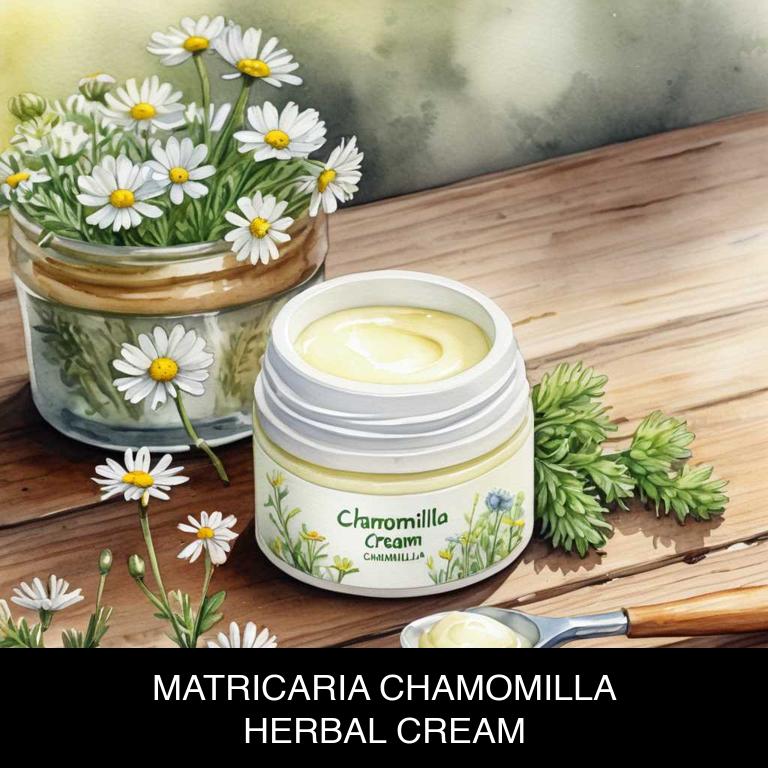
Medicinal Constituents
The list below shows the primary medicinal constituents in Matricaria chamomilla creams that help with fever blister on lip.
- Apigenin: This flavonoid helps reduce inflammation and soothe the skin, which can alleviate the discomfort and pain associated with fever blisters.
- Alpha-bisabolol: This terpene has anti-inflammatory and antiseptic properties, which can help to reduce swelling and prevent infection of the fever blister.
- Chamazulene: This sesquiterpene has anti-inflammatory and antiseptic properties, which can help to reduce swelling, prevent infection, and promote healing of the fever blister.
Parts Used
The list below shows the primary parts of chamomile used to make creams for fever blister on lip.
- Flowers: Used for fever blisters on lips due to their anti-inflammatory and antiseptic properties, which help soothe and calm the affected area.
- Flowers: Also used for fever blisters on lips due to their ability to reduce swelling and redness, providing relief from discomfort.
- Flowers: Additionally used for fever blisters on lips due to their antimicrobial properties, which help prevent infection and promote faster healing.
Quick Recipe
The following recipe gives a procedure to make a basic chamomile for fever blister on lip.
- Infuse 2 tablespoons of dried matricaria chamomilla flowers in 2 cups of boiling water for 5-7 minutes.
- Strain the infusion through a cheesecloth into a clean bowl to separate the liquid from the solids.
- Mix 1/4 cup of beeswax with 2 tablespoons of coconut oil in a double boiler over low heat.
- Combine the infused liquid with 2 tablespoons of shea butter and the melted beeswax mixture in a bowl.
- Whip the mixture with a hand mixer until it thickens and becomes a smooth, creamy texture.
5. Lavandula angustifolia
Lavandula angustifolia, also known as English lavender, creams helps with fever blister on lip because of its antiseptic and anti-inflammatory properties.
The active compounds in lavender oil, such as linalool and linalyl acetate, have been shown to reduce inflammation and promote healing of the skin. By applying lavender cream to the affected area, it can help to soothe and calm the skin, reducing the severity and duration of the fever blister.
This can lead to faster recovery and reduced discomfort.
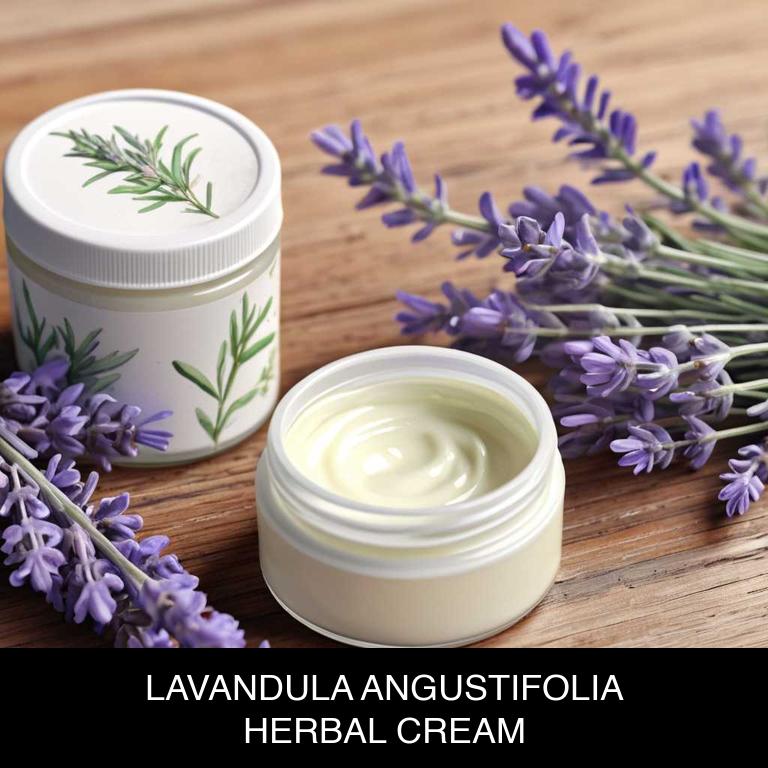
Medicinal Constituents
The list below shows the primary medicinal constituents in Lavandula angustifolia creams that help with fever blister on lip.
- Linalool: A terpene compound in Lavandula angustifolia that helps reduce inflammation and soothe pain associated with fever blisters, promoting faster healing.
- Linalyl acetate: A terpene ester in Lavandula angustifolia that exhibits antiseptic and anti-inflammatory properties, which can help combat infection and reduce swelling caused by fever blisters.
- Lavandulol: A terpene compound in Lavandula angustifolia that has antimicrobial and antiviral properties, which can help prevent the spread of infection and promote the healing of fever blisters.
Parts Used
The list below shows the primary parts of english lavender used to make creams for fever blister on lip.
- Leaves: The antimicrobial and antiviral properties of Lavandula angustifolia leaves help reduce the risk of infection and promote healing in fever blisters.
- Flowers: The soothing and anti-inflammatory properties of Lavandula angustifolia flowers help to reduce pain and swelling associated with fever blisters.
- Seeds: The antioxidant and anti-inflammatory compounds present in Lavandula angustifolia seeds help to protect the skin and promote healing in fever blisters.
Quick Recipe
The following recipe gives a procedure to make a basic english lavender for fever blister on lip.
- Harvest 1/4 cup of dried lavandula angustifolia flowers and store them in a cool dry place for 30 minutes.
- Combine 1/2 cup of distilled water with 2 tablespoons of dried flowers in a saucepan and bring to a boil.
- Reduce heat to a simmer and let steep for 10 minutes then strain the mixture through a cheesecloth.
- Mix 1/2 cup of aloe vera gel with 2 tablespoons of the infused lavandula angustifolia liquid in a bowl.
- Whip 1/4 cup of shea butter with 2 tablespoons of the aloe vera mixture until it reaches a smooth consistency.
6. Glycyrrhiza glabra
Glycyrrhiza glabra, also known as licorice, creams helps with fever blister on lip because of its anti-inflammatory and antiviral properties.
The active compounds in licorice, such as glycyrrhizin, have been shown to reduce swelling and promote healing of the skin. By reducing inflammation and combating the virus that causes fever blisters, licorice creams can help alleviate pain and discomfort associated with fever blisters on the lip.
This natural remedy can provide quick relief and promote faster recovery from these unsightly and painful sores.
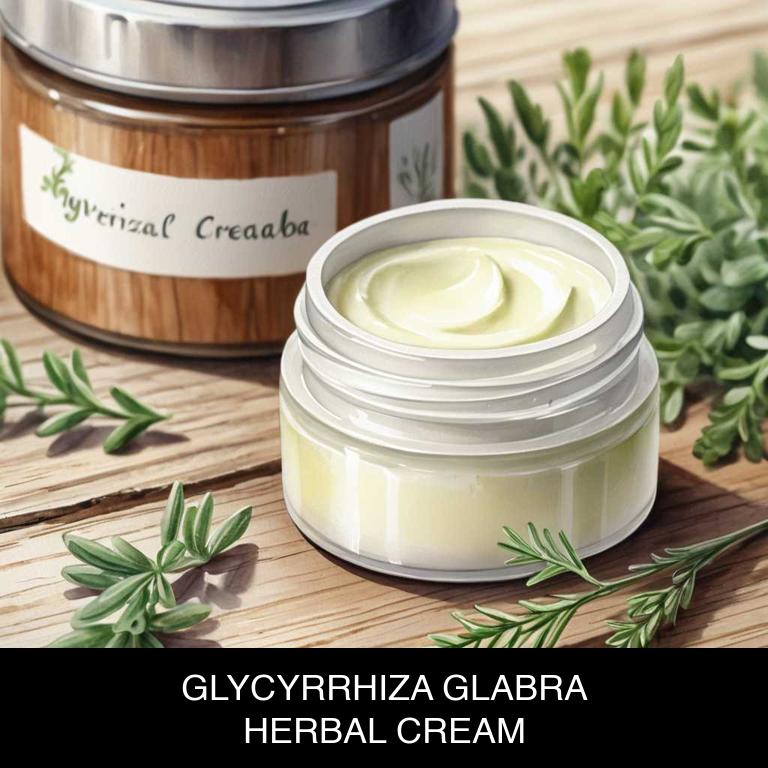
Medicinal Constituents
The list below shows the primary medicinal constituents in Glycyrrhiza glabra creams that help with fever blister on lip.
- Glycyrrhizin: This triterpenoid saponin helps to reduce inflammation and soothe the skin, thereby alleviating the discomfort and pain associated with fever blisters.
- Licoricidin: A phenolic compound, licoricidin has been shown to have anti-inflammatory and antimicrobial properties, which can help to combat the viral infection that causes fever blisters and promote healing.
- Licorisoflavan a: A flavonoid glycoside, licorisoflavan A has been found to possess antioxidant and anti-inflammatory properties, which can help to reduce the severity of fever blisters and accelerate the healing process.
Parts Used
The list below shows the primary parts of licorice used to make creams for fever blister on lip.
- Roots: They are used to make creams due to their high glycyrrhizin content, which has anti-inflammatory properties that help soothe and reduce fever blister symptoms.
- Leaves: They are utilized in creams for their antimicrobial and anti-inflammatory properties, which help to prevent infection and reduce the healing time of fever blisters.
- Roots (again, as it's the most prominent part used in creams): Additionally, roots are also used in creams due to their ability to inhibit the herpes simplex virus, which causes fever blisters, and their anti-inflammatory properties that help to reduce pain and discomfort.
Quick Recipe
The following recipe gives a procedure to make a basic licorice for fever blister on lip.
- Infuse 100g of dried glycyrrhiza glabra roots in 1l of distilled water for 2 hours at 60-80°c.
- Strain the infused mixture through a cheesecloth into a clean container to separate the roots.
- Combine 30g of beeswax and 30g of shea butter in a double boiler to melt.
- Mix the infused liquid with 20g of vitamin e oil and 10g of lanolin to create a smooth consistency.
- Pour the final mixture into sterile containers and allow it to cool and solidify for 2 hours.
7. Echinacea purpurea
Echinacea purpurea, also known as purple coneflower, creams helps with fever blister on lip because of its anti-inflammatory properties, which reduce swelling and pain.
The herbal extract has antiviral properties that help combat the herpes simplex virus, the primary cause of fever blisters. Additionally, Echinacea purpurea has been shown to boost the immune system, enabling it to fight off the virus more effectively.
This natural remedy has been used for centuries to soothe and heal fever blisters, providing relief from discomfort and promoting faster recovery.
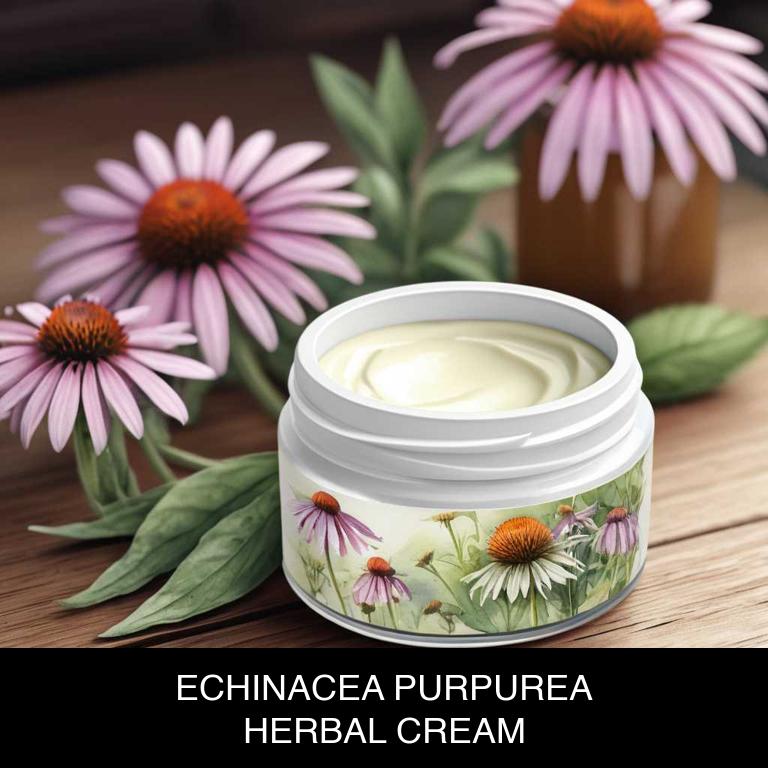
Medicinal Constituents
The list below shows the primary medicinal constituents in Echinacea purpurea creams that help with fever blister on lip.
- Cichoric acid: Acts as an anti-inflammatory agent, reducing redness and swelling associated with fever blisters.
- Isoquinoline alkaloids: Exhibits antiviral properties, helping to combat the herpes simplex virus responsible for fever blisters.
- Caffeic acid: Demonstrates antioxidant and antiviral activities, which may help to reduce the severity and duration of fever blisters.
Parts Used
The list below shows the primary parts of purple coneflower used to make creams for fever blister on lip.
- Roots: They contain high levels of alkylamides, which have anti-inflammatory and antimicrobial properties that can help soothe and heal fever blisters.
- Leaves: They are rich in flavonoids and phenolic acids, which have antioxidant and anti-inflammatory effects that can aid in reducing the severity of fever blisters.
- Flowers: They contain a high concentration of echinacoside, a glycoside that has anti-inflammatory and antiviral properties, making them effective in treating fever blisters.
Quick Recipe
The following recipe gives a procedure to make a basic purple coneflower for fever blister on lip.
- Extract echinacea purpurea flowers and roots using a solvent such as glycerin or ethanol at a ratio of 1:2 for 2 weeks.
- Strain the mixture through a cheesecloth or filter to remove plant material and obtain a clear liquid.
- Combine the liquid extract with a carrier oil such as coconut or sweet almond oil at a ratio of 1:4 for 30 minutes.
- Mix the oil and extract blend with a thickening agent like beeswax and candelilla wax at a ratio of 1:1 for 10 minutes.
- Pour the blended mixture into containers and let them cool and solidify at room temperature for 30 minutes.
8. Sanguisorba minor
Sanguisorba minor, also known as salad burnet, creams helps with fever blister on lip because of its anti-inflammatory and antiviral properties.
The herb contains tannins and flavonoids that help reduce redness and swelling associated with fever blisters. Its antiviral properties inhibit the replication of the herpes simplex virus, which causes fever blisters. Additionally, the cream's soothing and moisturizing effects help to calm the skin and promote healing, reducing the duration and severity of fever blisters.
This makes it a popular natural remedy for cold sore relief.
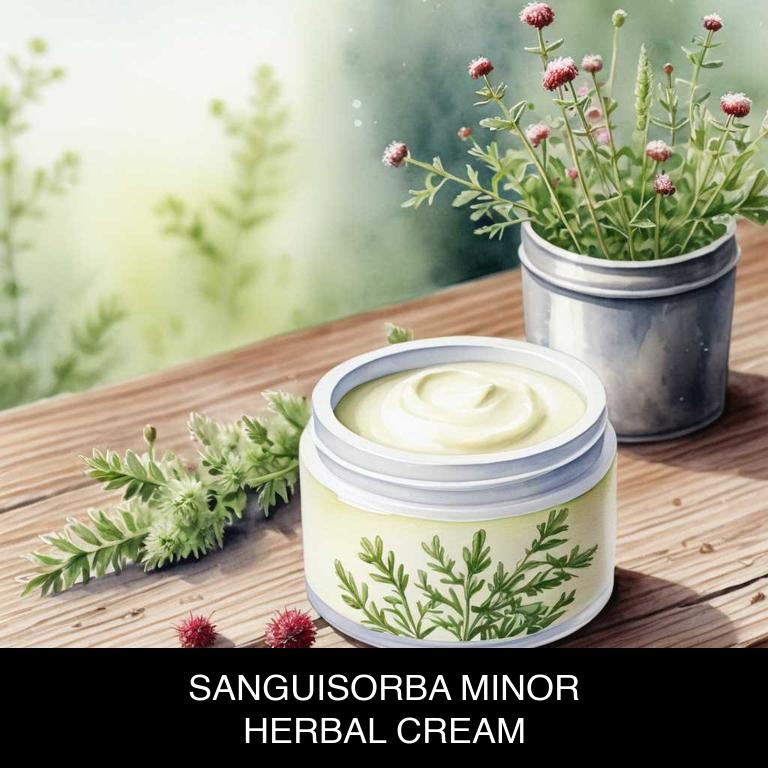
Medicinal Constituents
The list below shows the primary medicinal constituents in Sanguisorba minor creams that help with fever blister on lip.
- Flavonoids: Flavonoids in Sanguisorba minor have anti-inflammatory and antiviral properties, which help reduce the severity and duration of fever blisters on the lip by inhibiting viral replication and soothing inflammation.
- Phenolic acids: Phenolic acids in Sanguisorba minor exhibit antimicrobial and antioxidant properties, which help combat bacterial and viral infections causing fever blisters, while also reducing oxidative stress and promoting wound healing.
- Tannins: Tannins in Sanguisorba minor have astringent and antiseptic properties, which help dry out the fever blister, reduce its size and discomfort, and prevent further bacterial or viral infections.
Parts Used
The list below shows the primary parts of salad burnet used to make creams for fever blister on lip.
- Leaves: Used for their anti-inflammatory and antiseptic properties to treat skin irritations and infections.
- Roots: Used for their astringent and anti-inflammatory properties to treat skin conditions and wounds.
- Stems: Used for their anti-inflammatory and antiseptic properties to treat skin irritations and infections.
Quick Recipe
The following recipe gives a procedure to make a basic salad burnet for fever blister on lip.
- Harvest 30 grams of dried roots and leaves of sanguisorba minor at the end of the summer season.
- Infuse 20 grams of the harvested plant material in 100 ml of cold-pressed oil for 2 weeks.
- Strain the infused oil through cheesecloth and discard the solids after 2 weeks of infusion time.
- Mix 10 ml of the strained oil with 10 grams of beeswax and 10 ml of coconut oil in a double boiler.
- Heat the mixture in a double boiler at 160 degrees fahrenheit for 10 minutes to create a smooth cream.
9. Plantago major
Plantago major, also known as plantain, creams helps with fever blister on lip because of its anti-inflammatory and antiviral properties.
The plantain plant has been traditionally used to treat various skin conditions, including cold sores and fever blisters. The creams contain active compounds that help reduce pain, swelling, and inflammation associated with fever blisters.
By applying plantain cream to the affected area, it can speed up the healing process and alleviate symptoms, making it a popular natural remedy for treating fever blisters on the lip.
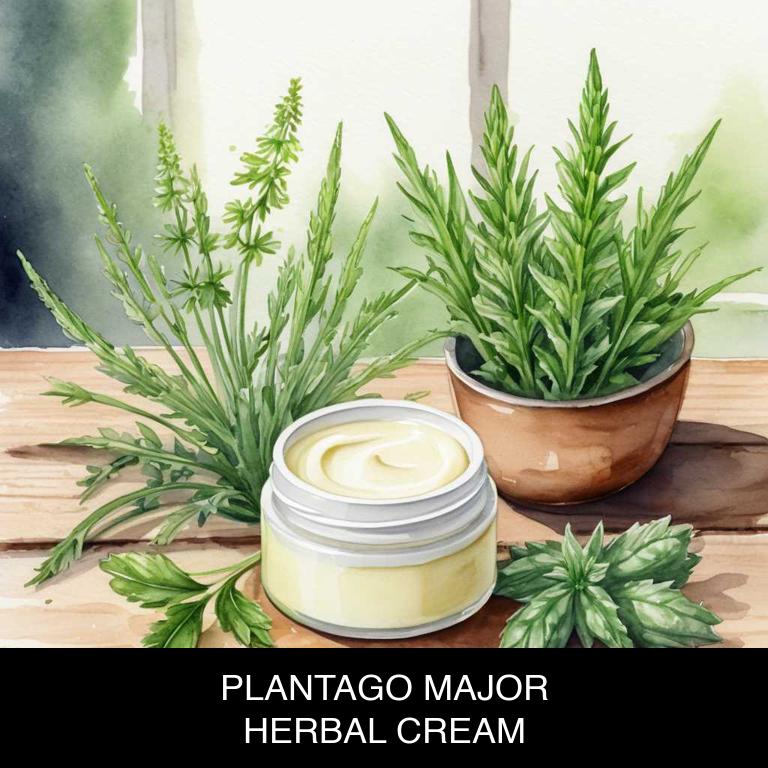
Medicinal Constituents
The list below shows the primary medicinal constituents in Plantago major creams that help with fever blister on lip.
- Apolipoprotein a-1: This constituent helps to reduce inflammation and prevent the formation of fever blisters by inhibiting the replication of herpes simplex virus.
- Phenolic compounds: These compounds exhibit antimicrobial and anti-inflammatory properties, which can help to reduce the severity and duration of fever blisters.
- Inulin: This polysaccharide has anti-inflammatory and soothing effects, which can help to reduce pain and discomfort associated with fever blisters, promoting healing and tissue repair.
Parts Used
The list below shows the primary parts of plantain used to make creams for fever blister on lip.
- Leaves: Astringent and anti-inflammatory properties in the leaves help to dry out the fever blister and reduce inflammation.
- Seeds: Plantago major seeds contain mucilage, a soothing gel-like substance that helps to protect and calm the affected area.
- Roots: The roots of Plantago major are said to possess antimicrobial properties that can aid in preventing infections and promoting healing of the fever blister.
Quick Recipe
The following recipe gives a procedure to make a basic plantain for fever blister on lip.
- Harvest 100g of fresh plantago major leaves on a dry sunny day for the best potency.
- Dry the harvested leaves in a low-temperature oven at 50°c for 2 hours to remove moisture.
- Steep 20g of dried plantago major leaves in 200ml of olive oil in a double boiler for 2 hours.
- Strain the infused oil through a cheesecloth and discard the solids to obtain the herbal extract.
- Mix the herbal extract with 100g of beeswax and 100g of shea butter in a double boiler until fully incorporated.
10. Symphytum officinale
Symphytum officinale, also known as comfrey, creams helps with fever blister on lip because it contains anti-inflammatory and antiviral properties that reduce swelling and soothe the pain associated with fever blisters.
The allantoin present in comfrey creams accelerates the healing process by promoting tissue repair and regeneration.
Additionally, comfrey's anti-inflammatory properties help to reduce redness and swelling, making it an effective remedy for fever blisters on the lip, allowing for faster recovery and minimizing the risk of scarring.
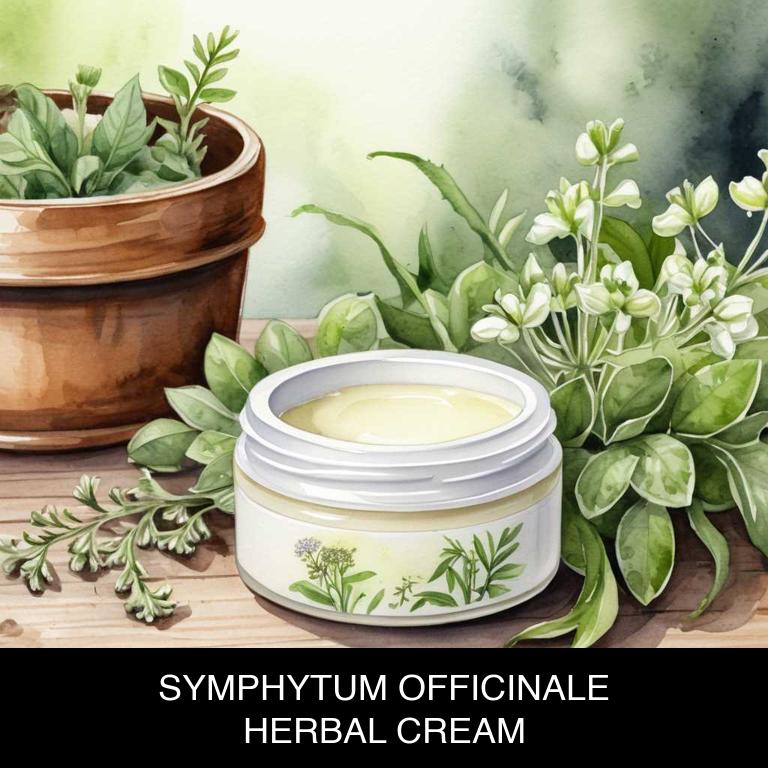
Medicinal Constituents
The list below shows the primary medicinal constituents in Symphytum officinale creams that help with fever blister on lip.
- Allantoin: It helps to accelerate wound healing and reduce inflammation, which can aid in the recovery from fever blisters.
- Saponins: These compounds have anti-inflammatory and antimicrobial properties, which can help to soothe and protect the affected area from infection and promote healing.
- Glycosides: Specifically, the glycosides present in Symphytum officinale have been shown to possess anti-inflammatory and analgesic properties, which can help to relieve pain and reduce inflammation associated with fever blisters.
Parts Used
The list below shows the primary parts of comfrey used to make creams for fever blister on lip.
- Leaves: Used in creams for fever blisters due to their anti-inflammatory and antiviral properties.
- Roots: Used in creams for fever blisters because they contain compounds that help in wound healing and reduce pain.
- Flowers: Used in creams for fever blisters due to their anti-inflammatory and soothing properties that help in reducing discomfort and promoting healing.
Quick Recipe
The following recipe gives a procedure to make a basic comfrey for fever blister on lip.
- Harvest 1 cup of fresh symphytum officinale leaves and flowers in the morning after dew has evaporated.
- Clean and dry the harvested plant material by air drying it for 2-3 days.
- Steep 1 cup of dried plant material in 2 cups of carrier oil for 2-3 weeks with occasional shaking.
- Strain the oil mixture through a cheesecloth or a coffee filter into a clean container.
- Mix 1 part of the infused oil with 1 part of beeswax and 1 part of coconut oil in a double boiler.
What is the best combination of herbal creams to use for fever blister on lip?
The best combination of herbal creams that help with fever blister on lip is Aloe vera and Tea tree oil.
Aloe vera's anti-inflammatory and soothing properties calm the skin, reducing pain and discomfort. Tea tree oil's antiviral properties help combat the herpes simplex virus, causing the fever blister.
Apply Aloe vera cream to the affected area to moisturize and soothe, and mix a few drops of Tea tree oil with a carrier oil like coconut or olive oil to apply topically, promoting faster healing and reducing the risk of recurrence.
What ailments similar to fever blister on lip are treated with herbal creams?
Ailments similar to fever blister on lip that are treated with herbal creams are cold sores, herpes simplex, and canker sores.
Herbal creams containing ingredients like aloe vera, tea tree oil, and lavender oil have anti-inflammatory, antiviral, and antibacterial properties that help soothe and heal these conditions.
These natural remedies may reduce symptoms such as pain, swelling, and inflammation, promoting faster healing and preventing scarring.